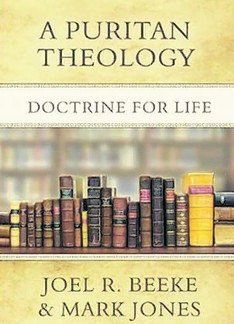Joel Beeke & Mark Jones
Reformation Heritage Books
1056, £60.00
ISBN: 978-1-60178-166-6
Star Rating: 5
Stimulating, dynamic and exciting! These are worthy words to describe this new title on the Puritans.
It is an original contribution, because Joel R. Beeke and Mark Jones have attempted to systematise puritan thought along eight theological lines — something not attempted before: prolegomena; theology proper; anthropology and covenant theology; Christology; soteriology; ecclesiology; eschatology; and theology in practice.
What is so refreshing is that a whole section is devoted to puritan ecclesiology. Within many circles in recent decades, there has sometimes arisen the false impression that Puritans were more interested in theology than ecclesiology. This major new work explodes that notion.
For those not so familiar with puritan ideals and theology, the brief introduction (pp. 1-7) will serve well in giving an initial taster. The puritan ideal and vision, in a strict historical sense, was within the British church from about 1560-1662, though some continental writers are included.
Puritan ideals were essentially bound up with their doctrine of the church. They contended for purity in doctrine, public and family worship, and church government. Though not all Puritans were homogenous in their detailed conclusions, they were all very concerned with these issues.
Some chapters provide a ‘smorgasbord’ of puritan thought, in presenting a range of ideas on a given subject from a variety of Puritans. This could be said of chapter 2, on ‘Puritan hermeneutics and exegesis’, an outstanding chapter that should be read by every gospel minister and elder.
However, other chapters distil the thought of single authors on given topics. For example, chapter 3 is on ‘The learned doctor William Ames and The marrow of theology’, chapter 6 on ‘John Owen on communion with the triune God’, and chapter 49 on ‘Thomas Manton on the judgment according to works’.
For those who may not have read much by puritan authors, this will introduce them to men such as Thomas Watson, John Owen, John Bunyan, Samuel Rutherford, Stephen Charnock, John Flavel and William Perkins.
For those who have read Puritans for a number of years, it will lead them on new trails of theological discovery, as they are introduced to Puritans with whom they are not familiar, and to works they may not have considered before.
It is important to underline that this is not the last word on this subject and not an infallible handbook — a point highlighted in chapter 4, where it is asserted that Thomas Watson was a Westminster divine (p. 59). Watson is one of the most widely sought after puritan writers, but he was not a Westminster divine!
This title is unreservedly commended.
Kevin Bidwell
Sheffield









